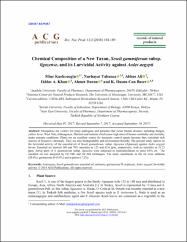| dc.contributor.author | Kürkçüoğlu, Mine | |
| dc.contributor.author | Tabanca, Nurhayat | |
| dc.contributor.author | Ali, Abbas | |
| dc.contributor.author | Khan, Ikhlas A. | |
| dc.contributor.author | Duran, Ahmet | |
| dc.contributor.author | Başer, K. Hüsnü Can | |
| dc.date.accessioned | 2019-10-19T14:15:23Z | |
| dc.date.available | 2019-10-19T14:15:23Z | |
| dc.date.issued | 2018 | |
| dc.identifier.issn | 1307-6167 | |
| dc.identifier.uri | https://dx.doi.org/10.25135/mp.17.17.05.035 | |
| dc.identifier.uri | https://hdl.handle.net/11421/12809 | |
| dc.description | WOS: 000416971500009 | en_US |
| dc.description.abstract | Mosquitoes are vectors for many pathogens and parasites that cause human diseases including dengue, yellow fever, West Nile, chikungunya, filariasis and malaria which cause high rates of human morbidity and mortality under extreme conditions. Plants are an excellent source for mosquito control agents because they constitute rich sources of bioactive chemicals. They are also biodegradable and environment-friendly. The present study reports on the larvicidal activity of the essential oil of Seseli gummiferum. subsp. ilgazense (Apiaceae) against Aedes aegypti larvae. Essential oil showed 100 and 70% mortality at 125 and 62.6 ppm, respectively, with no mortality at 31.25 ppm. Aerial parts of S. gummiferum subsp. ilgazense were subjected to hydrodistillation to yield 0.6% oil. The essential oil was analyzed by GC-FID and GC-MS techniques. The main constituents in the oil were sabinene (28.8%), germacrene D (9.5%) and alpha-pinene (7.2%). | en_US |
| dc.description.sponsorship | Deployed War-Fighter Protection Research Program Grant - U.S. Department of Defense through the Armed Forces Pest Management Board | en_US |
| dc.description.sponsorship | This study was partly supported by the Deployed War-Fighter Protection Research Program Grant funded by the U.S. Department of Defense through the Armed Forces Pest Management Board. We thank Dr. James J. Becnel, Mosquito and Fly Research Unit, Center for Medical, Agricultural and Veterinary Entomology, USDA-ARS, Gainesville, for supplying Ae. aegypti eggs. Part of this work was presented as a poster presentation during the Inaugural Symposium of the Phytochemical Society of Asia (ISPSA 2015), 30 August - 2 September 2015, Tokushima, Japan. | en_US |
| dc.language.iso | eng | en_US |
| dc.publisher | Acg Publications | en_US |
| dc.relation.isversionof | 10.25135/mp.17.17.05.035 | en_US |
| dc.rights | info:eu-repo/semantics/openAccess | en_US |
| dc.subject | Asteraceae | en_US |
| dc.subject | Seseli Gummiferum | en_US |
| dc.subject | Essential Oil | en_US |
| dc.subject | Sabinene | en_US |
| dc.subject | Germacrene D | en_US |
| dc.subject | Alpha-Pinene | en_US |
| dc.subject | Aedes Aegypti | en_US |
| dc.subject | Larvicidal Activity | en_US |
| dc.title | Chemical Composition of a New Taxon, Seseli gummiferum subsp ilgazense, and its Larvicidal Activity against Aedes aegypti | en_US |
| dc.type | article | en_US |
| dc.relation.journal | Records of Natural Products | en_US |
| dc.contributor.department | Anadolu Üniversitesi, Eczacılık Fakültesi, Farmakognozi Anabilim Dalı | en_US |
| dc.identifier.volume | 12 | en_US |
| dc.identifier.issue | 2 | en_US |
| dc.identifier.startpage | 184 | en_US |
| dc.identifier.endpage | 189 | en_US |
| dc.relation.publicationcategory | Makale - Uluslararası Hakemli Dergi - Kurum Öğretim Elemanı | en_US |
| dc.contributor.institutionauthor | Kürkçüoğlu, Mine | |
| dc.contributor.institutionauthor | Başer, K. Hüsnü Can | |


















